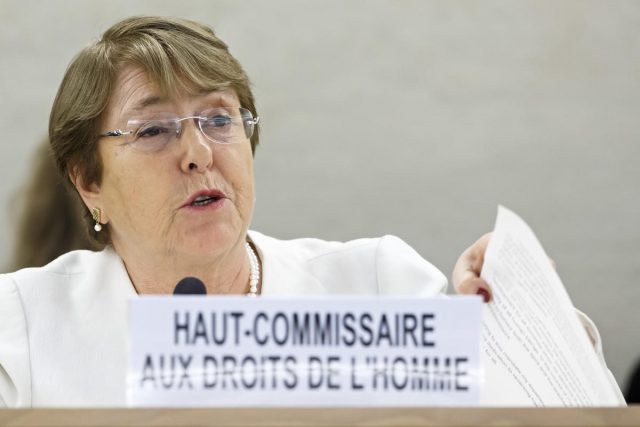10 September 2018 – Today, at the opening of the 39th Session of the United Nations (UN) Human Rights Council (HRC) in Geneva, Michelle Bachelet delivered her first opening statement as the new High Commissioner for Human Rights. Her remarks demonstrated a commitment to continue the previous High Commissioner Zeid Raad Al Hussein’s legacy of a strong and deliberate approach to championing human rights around the world, including in the Gulf region. Americans for Democracy & Human Rights in Bahrain (ADHRB) applauds High Commissioner Bachelet for highlighting country specific cases of concern and welcomes her criticism of severe human rights violations in Bahrain and Saudi Arabia.
In her opening remarks, High Commissioner Bachelet condemned Bahrain’s practice of arbitrary denaturalization, noting the increasing number of cases reported to her office. “The legislation underpinning such actions should be reviewed in line with Bahrain’s obligations under international law,” said Bachelet. Both Bahrain’s nationality and counter-terror legislation provide broad grounds for the courts and the Ministry of Interior to arbitrarily revoke citizenship in reprisal for peaceful dissent. In May 2018 alone, Bahrain revoked the citizenship of 115 individuals amid reports of torture and due process abuses in an unfair mass trial. It was the largest mass denaturalization case since 2012, making 2018 one of the worst years for citizenship revocations in the kingdom’s history.
High Commissioner Bachelet also raised concerns over the kingdom’s intensified crackdown on civil and political space ahead of the parliamentary elections this November, stating “reports of possible exclusion of Bahraini citizens from the forthcoming elections of the National Assembly are disturbing.” All major political opposition groups have been arbitrarily dissolved and the government issued new legislation banning their members from ever seeking or holding elected office. Thousands of political prisoners remain incarcerated and the government continues to target opposition leaders. Sheikh Ali Salman, head of the now-dissolved Al-Wefaq opposition group, is serving a four-year prison sentence in relation to political speeches, and he may now face the death penalty on new arbitrary charges of espionage. At the same time, the government has further restricted free press, forcing the only independent newspaper to close and creating an atmosphere that renders a free and fair election virtually impossible.
Likewise, High Commissioner Bachelet called for the release of all imprisoned human rights defenders in Bahrain, specifically raising the case of Nabeel Rajab, president of the Bahrain Center for Human Rights. Rajab is currently serving a total of seven years in prison on charges stemming solely from his exercise of free expression. Last month, the UN Working Group on Arbitrary Detention determined that Rajab’s imprisonment is unlawful and called for his immediate release, warning that Bahrain’s widespread use of arbitrary detention could amount to crimes against humanity.
Human rights abuses in Saudi Arabia were also addressed in the opening statement, with High Commissioner Bachelet finding “the recent crackdown on peaceful human rights defenders, especially defenders of women’s equality and women’s rights” to be particularly disturbing. She raised the cases of both Samar Badawi and Nassima Al-Sadah, women human rights defenders who were arrested on 30 July 2018. Bachelet also raised serious concern regarding the case of Israa al-Ghomgham, who is facing the death penalty on charges related to participation in protests. High Commissioner Bachelet said, “these and other arbitrary arrests of peaceful activists for the collective good sharply contradict the spirit of the country’s proclaimed new reforms.” She called on the authorities to release all individuals detained for exercising their fundamental freedoms.
“High Commissioner Bachelet has made it clear that she is dedicated to building on her Office’s powerful legacy of impartially promoting human rights around the world, especially as abuses are on the rise in countries like Bahrain and Saudi Arabia,” says Husain Abdulla, Executive Director of ADHRB. “As the two kingdoms look to distract from deepening repression, it is especially crucial that international human rights mechanisms hold them accountable for continuing violations. With Bahrain now even seeking a seat on the Human Rights Council, the High Commissioner’s statement is a critical reminder of the worsening human rights crisis and a timely call to action: the international community must pressure Bahrain to meet its commitments and end its suppression of civil society at once.”
ADHRB welcomes High Commissioner Bachelet’s criticism of ongoing human rights violations in Bahrain and Saudi Arabia during her opening statement to HRC 39. We call on Bahrain and Saudi Arabia to immediately implement her recommendations to lift restrictions on civil society, repeal abusive legislation, and release all prisoners of conscience.





